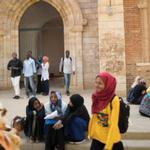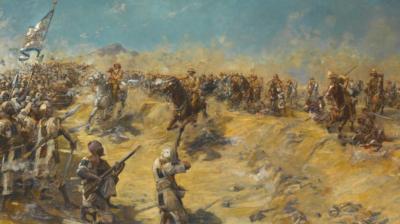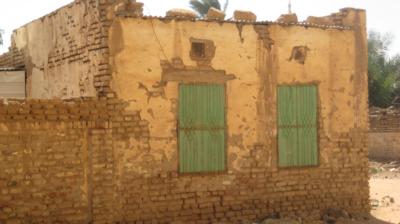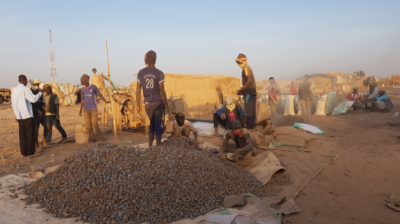The good and evil in war
The war in Sudan has caused immense human suffering and inflicted huge economic costs. Yet, in the midst of evil the war has also brought about good.
The war between the Sudanese Armed Forces (SAF) and the paramilitary Rapid Support Forces (RSF) has polarized and divided Sudanese society. It has caused destruction and suffering and turned life into hell for millions. More than six million people have been displaced. Industry and markets have been looted and destroyed. The economic cost probably amounts to billions of US dollars. This blog post is an attempt to shed light on the socio-economic repercussions of the ongoing war, but also on the good that comes out of it.
Social and political polarization
War has divided an already politically and socially fragmented society leading to a social polarization that threatens the fabric of society. It has divided people in three: A pro SAF majority, a significantly increasing pro RSF minority and a considerable portion advocating the slogan: No to war.
War has the potential to bring out the worst in people. Opportunists have exploited war victims and aggravated their suffering by raising the prices of consumer goods, houses and apartment rentals and transportation fees. Even worse; many have seized the opportunity to steal and loot. Shafshafa is the name given to this ill practice. In association with the shafshafa, markets specialized in selling stolen goods have emerged in Khartoum and other towns. These infamous markets are named after the RSF leader and have come to be known as Aswag Dagalo (Dagalo markets). Even relief aid items have found their way to the Dagalo markets.
Opportunists have exploited war victims and aggravated their suffering by raising the prices of consumer goods, houses and apartment rentals and transportation fees.
For the people who have been forced to flee, life now looks different. Many have had their suffering aggravated by people seeking to benefit financially from the war. The majority of the displaced have joined their extended families, a considerable portion have settled in schools while others rent apartments and houses facing increasingly high living costs. What they have in common is a poor standard of living. They mostly live in overcrowded houses or centers with few facilities, little privacy and severe restrictions on personal freedom. The relationship between the host communities and the newcomers has in some instances also been less than amiable. Competition over limited work opportunities has caused dispute as many of the displaced persons, trying to make a living, have turned to businesses like transportation, petty trade, and market vending. There has also been disagreement and disputes when the lifestyle of Khartoumians has clashed with the lifestyle in host communities.
Bringing out solidarity
Yet, the war has also proved its potential to bring out the best in people. Despite the humanitarian catastrophe that the war has caused, the desperate situation gets little attention internationally. Humanitarian aid has been meagre, and the Sudanese people have largely been left to fend for themselves. In a situation of extreme hardship, people have come together to support each other. The war has brought about extraordinary solidarity and showed a people ready to deal with emergencies.
Life continues despite shooting, air bombing and lack of humanitarian relief. Popular markets and other busy areas are still frequented by people leading their lives, buying vegetables, fruits and other goods. The tea sellers are still in business. While most, if not all, big stores and shops have been closed, many petty traders, mostly women, selling small quantities of consumer goods on the roadside dominate the scene. In areas with military confrontation, in the absence of public transportation, bicycles and donkey carts are used to transport people and goods.
As time passes by, a sense of normality re-emerges in the everyday lives of the people who have been displaced because of the war. In Singa town, I have witnessed both wedding and engagement ceremonies, and dancing parties.
The good in war is evident in the amazing solidarity that has transcended ethnic, religious and gender barriers in the war zone. People share their meagre dinners, cooperate and coordinate to maintain water networks, repair electricity shorts, and come together in a joint effort to guard their houses and protect themselves from thieves and bandits in the absence of state. People have restored norms of reciprocity and social solidarity, and have taken on the task of providing humanitarian assistance: Sheikh al-Amin Omar, a famous religious leader in Omdurman, provided food and shelter to families on the run while his disciples and volunteers distributed food and water to people under siege. At the time of exodus from Khartoum, villagers congregated on the roadside offering food, water, tea and juice to the people who had been forced to flee their homes, and upon their arrival at their final destinations, they were welcomed by social activists providing help and advice as well as psychological support. In the displacement centers, in the absence of adequate relief aid, philanthropists still regularly provide food and services to war victims.
The good in war is evident in the amazing solidarity that has transcended ethnic, religious and gender barriers in the war zone.
Boosting local economies
Interestingly, the war has also provided new economic opportunities, particularly in areas that have traditionally been marginalized. In fact, the exodus of people from Khartoum has resulted in the cadre of specialists and professionals like physicians, dentists, engineers and technicians, now being spread all over the country instead of being centralized in the capital city. The employment of these professionals in public and private institutions has crucially added to the service sector. Many hospitals, clinics and workshops have now been opened in the regional urban centers and, for the first time, even in remote areas that previously lacked access to such services. Furthermore, this process has contributed to flourishing local economies by providing work opportunities to workers like carpenters, plumbers, metal workers, and blacksmiths, and through boosting the stagnant real estate sector encouraging many people to prepare, repair, and build new houses and shops hoping for a handsome rental income.
Many hospitals, clinics and workshops have now been opened in the regional urban centers and, for the first time, even in remote areas that previously lacked access to such services.
In general, the incoming surge of IDPs has led to a market expansion which has been manifested in the emergence of many new markets and market extensions in different towns. In parallel, new shops and cafes have been opened and small busy areas have emerged where the displaced youth can come together, somehow compensating for what they have missed since leaving Khartoum.
People have become more realistic and more resilient in their assessment of the situation. Realizing that the war will not end any time soon, people have started thinking about what they left behind when fleeing. These concerns have also sparked a whole new line of business: The shafshafiin (sing. shafshaaf). These are people who are hired to go back into the war zone to check up on other people’s houses and properties. The shafshaaf knows how to get into and navigate in military confrontation areas to get hold of necessities like medicines from pharmacies, and fetch important documents such as passports and marriage certificates.
The war has disclosed the good and the evil, the egoistic and the altruistic. Its consequences are devastating. Yet, it has united people and solidified them in the face of the crisis. And it provides us with a useful lesson: To unite and add your voice to those who call for its end and to fight the narrative of hate and polarization.
This Sudan blog post is written by Elhadi Ibrahim Osman, associate professor at the University of Sennar.
The views expressed in this post are those of the author, and do not necessarily reflect the opinions of the SNAC project or CMI.





